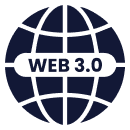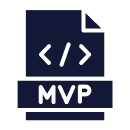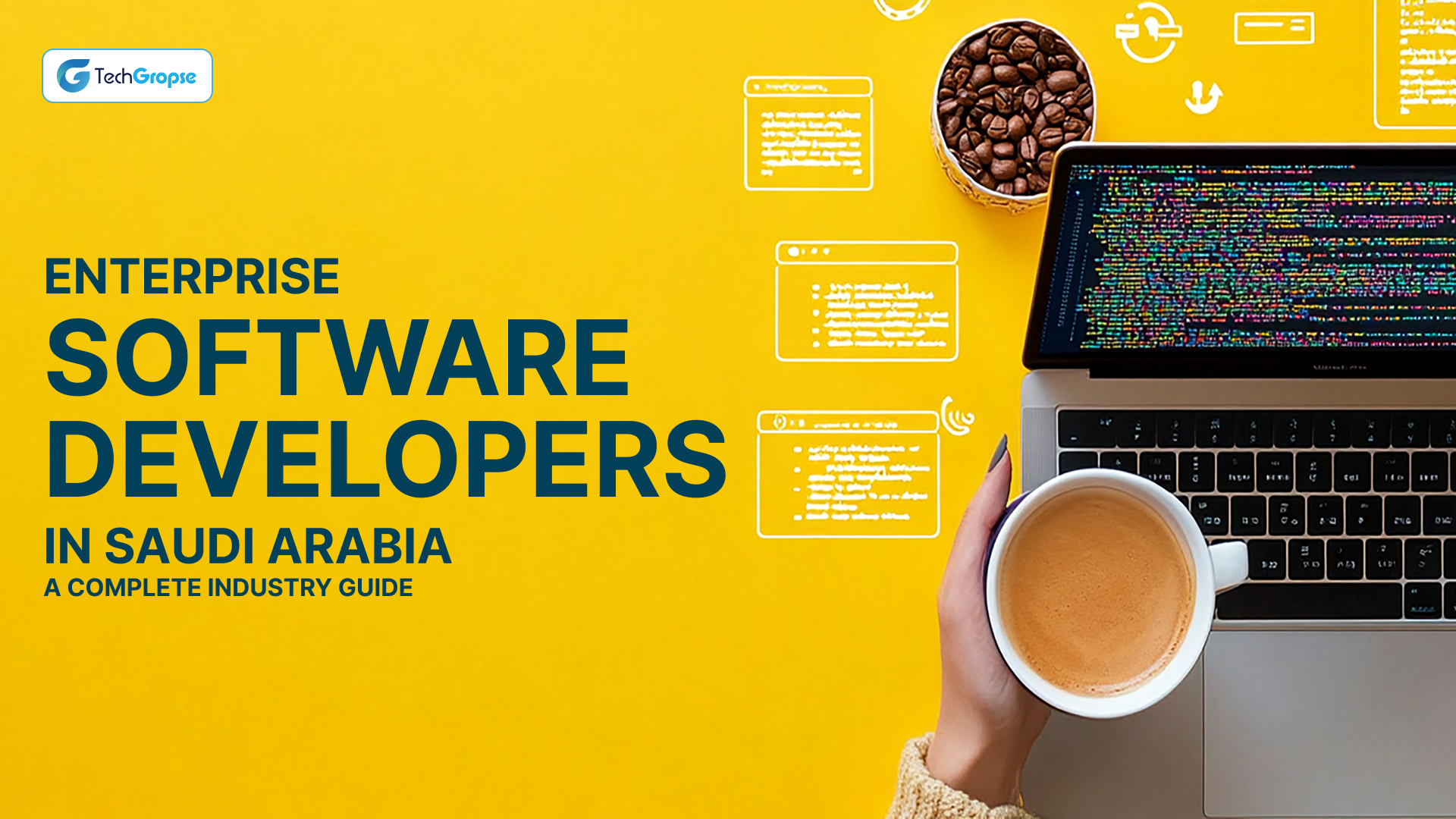As Saudi Arabia is transforming its economy, the demand for enterprise software development in Saudi Arabia is acquiring a faster pace than ever.
What used to be a back-office function is now a national priority. The Kingdom’s bold Vision 2030 has done more than digitize government services or modernize corporate systems. It has pushed enterprise technology to the frontlines of innovation. Ministries, giga-projects, hospitals, banks, oil conglomerates.
All industries are rethinking their digital foundations, turning legacy platforms into agile, AI-ready, cloud-native ecosystems that can move as fast as Saudi’s ambitions demand. Therefore, enterprise software is no longer about supporting business but actually driving it.
Today, CTOs and business leaders in KSA face a new kind of urgency: how do you build software that’s not only scalable and secure, but also culturally aligned, regulation-ready, and future-proof in a hyperconnected KSA landscape? How do you compete globally while staying rooted in regional relevance?
If these questions also matter to you, this guide is built to answer exactly that. Here, you’ll find:
- The industries driving the demand for custom enterprise software in Saudi Arabia
- Step-by-step process of building an industry-ready enterprise software
- Cost of enterprise software development in Saudi Arabia
- Benefits of developing a custom enterprise software that product leaders and business founders can’t afford to ignore
So why wait then? Let’s get started
For better results, consider working with a Hire App Developers that specializes in innovative solutions.
What Is Enterprise Software Development?
Enterprise software development is designing, building, and scaling digital systems to run core operations for large organizations. Unlike consumer apps, these enterprise software solutions are built with performance, integration, security, and flexibility in mind.
They need to speak to other systems, support thousands of users at one time, comply with many regulations, and change over time as the enterprise itself grows. Whether it is a nationwide ERP, a healthcare management platform, or a custom CRM for banks, enterprise software is created to run complicated business operations.
Off-the-Shelf or Custom Enterprise Software–Which One is Right for Your Business?
One of the most important decisions you will be making in the early stages is if you’ll go for a ready-made (off-the-shelf) solution or invest in building a custom platform perfectly tailored for all your workflows, goals, and future.
However, once sensed, they offer some degree of convenience. They are plug-and-play and good for the short term only of buying, and possibly come loaded with pre-engineered features for generic business requirements. Think SAP; Salesforce; Microsoft Dynamics. They are robust, proven, and widely accepted.
But here’s the big trade-off. These tools are not built to your specifications. They force your team to change to the application, and not the other way around. That is exactly where custom enterprise software comes into play.
In custom enterprise software development, it is built around the exact workflow, user-type needs for compliance, and long-term strategy. This becomes all the more important in Saudi Arabia, in connection with Enterprise Software Development.
Localization matters; language matters; regional compliances matter (think Saudi e-Invoicing or GAZT integrations, etc.), and integration with Vision 2030 platforms matter a lot.
Custom enterprise software is an edge in your offspring if your sector has complex operations, such as energy, finance, health, or government. Have a look below and you will realize the difference.
Comparison Between Off-the-Shelf vs. Custom Enterprise Software
| Feature | Off-the-Shelf Software | Custom Enterprise Software |
|---|---|---|
| Speed to Launch | Fast—ready out of the box | Slower—requires planning and development |
| Initial Cost | Lower upfront | Higher initial investment |
| Customization | Limited to available features | Fully tailored to your workflows |
| Scalability | May hit limits as you grow | Built to scale with your business |
| Integration with KSA Systems | May lack local integrations | Can integrate with Absher, GAZT, DGA systems |
| Compliance & Localization | Generic global features | Arabic UI, local laws, and data sovereignty |
| Long-term ROI | May incur extra licensing/support fees | Higher ROI with fewer workarounds |
| Vendor Lock-in Risk | High—dependent on provider roadmap | Low—you own the IP and roadmap |
Major Benefits of Developing Custom Enterprise Software for Businesses

This is probably the most important thing for you. You may think that customer enterprise software development is very resource- and effort-intensive in the Kingdom of Saudi Arabia.
However, it is time you gave thought to the benefit of custom enterprise software development. Below are some compelling benefits that come at the cost of building a custom enterprise software model entirely from scratch for your business workflows.
1. Built Around Your Business
With an off-the-shelf tool, your team would have to work around the software. Build enterprise software, and the software bends around your existing business operations. Every feature, dashboard, and integration is crafted with your structure, operators, and KPIs in mind.
Speed of alignment would be the determining factor between friction and flow in a rapidly evolving sector such as energy, finance, or logistics. With custom enterprise software solutions in Saudi Arabia, businesses can start bridging operations with innovations in their way.
2. Smooth Integration within Your Entire Ecosystem
Today, Saudi enterprises do not work in isolation. Instead, they work on complex digital ecosystems. CRM have conversations with ERPs, government APIs are hooked to HR systems, and compliance portals provide real-time updates.
Ensuring that your systems engage from Project Absher all the way through your cloud stack would be a task a custom-built software would sincerely own. Forty-way Integration, therefore, makes for smoother and more future-proof.
3. Higher Security and Local Compliance from the Get-Go
With rising cybersecurity threats and growing data localization laws, a one-size-fits-all globally generic solution can barely do its job. Custom software solutions bear security and compliance at heart when made by a team well aware of the regulatory nuances.
From encrypting your data, controlling access, ensuring compliance with national cybersecurity standards of Saudi Arabia—all these keep your platform secure and ready. And this is why today, government-backed enterprises tend to prioritize enterprise software development in Saudi Arabia more and more from local or at least region-aware partners.
4. Unlimited Scalability for Perpetual Growth
Growth in your business should be a good thing, not something that hampers the implementation of software. While off-the-shelf packages give you a constant fight for upgrades and limitations from the outset, your custom enterprise software is designed to grow alongside you. Invitation for 10x more users? Add a new module? Connect with a new third-party system? You just don’t have to ask anybody for permission; you already have the basis for it.
5. Get Full Ownership and Strategic Freedom
If you go custom, you own your software, your roadmap, and your data. No vendor lock-in. No surprise licensing hikes. No waiting for an extra six months for a feature you need now.
This control-assisted iteration fast, launches smartly, and positions you for real-time accommodation to new challenges or opportunities. This is also the major reason the best enterprise software developers in Saudi Arabia come in handy to big brands and public sector organizations willing to realize their own vision, while retaining full ownership of IP.
6. Better User Adoption and Experience
Enterprise software designed around actual user roles and locale context-enables high adoption. Smart dashboards, Arabic-English toggles, mobile-first features-anything for which your users need to work smarter rather than harder. Productivity goes up-the less-training time, more importantly, software that users want to use.
7. Strategic Alignment with KSA’s Vision 2030 Goals
Saudi Arabia’s Vision 2030 sets out the drawing board to not only transform the country but every industry. Custom enterprise software ensures the agility for businesses to align with that vision, be it in smart city initiatives, data transparency, ESG reporting, or operational digitization.
By coming up with software grounded in the country’s priorities, companies aren’t following, they’re paving the way hence becoming strategic partners to the country’s digital future.
Also Read: How to Choose the Right Software Development Partner in KSA?
Key Industries Driving Demand in Enterprise Software Development in Saudi Arabia

Changing enterprise software is becoming the strategic backbone of the national transformation in Saudi Arabia. From giga-projects to digital banks, every sector is doing a new form of tech that powers scale, intelligence, and resilience. Let us see where demand grows fastest:
Government: Building Digital Foundations for a Smarter State
With powerhouse organizations such as the Digital Government Authority (DGA) and SDAIA setting the highest standards, ministries and municipalities have now enable very generous budgets for the building of platforms digitizing the citizen services, automating the compliance, and undertaking the governance in real-time.
Enterprise-level software requirements are growing rapidly: from licensing portals to procurement platforms to AI-enabled dashboards of public data. This is quite an important area where enterprise software development companies in Saudi Arabia are contributing to shaping these systems with local knowledge, UX in Arabic, and security-first orientation.
Oil & Energy: From Assets to Algorithms
Aramco and other energy giants are no longer just about barrels and pipelines. They are pouring millions of dollars into enterprise tech that converts infrastructure into intelligence. For example, AI-powered predictive maintenance, IoT-enabled operational dashboards, and those great big ERP ecosystems running 24/7 all over the world.
Enterprise software here has to deal with real-time data flow, complex logistics, and industrial safety. One of the most demanding use cases is, therefore, gaining momentum and is an important driver of the business software development in Saudi Arabia
FinTech: A Sweet Spot for Compliance and Innovation
A quiet revolution is going on in Saudi Arabia’s finance and banking industries, and enterprise software is at its heart. Now, banks, and fintech need software that marries compliance with extreme personalization, facilitated by AI-driven CRMs, advanced risk-scoring tools, and secure API platforms that enable inter-operation among financial ecosystems.
Health: Where Care Is Digitized at a National Scale
In the present time, both public and private providers are investing in EHR systems, platforms for virtual care, AI diagnostics, and telemedicine infrastructure for remote areas, for multilingual patients, and for complex data security requirements.
Enterprise software needs more than mere features in this sector; it needs accuracy, availability, and integration at a very deep level with insurance, labs, and even government portals, so it is no surprise that, in the software development trends in Saudi Arabia 2026, healthtech ranks among the top investment priorities.
Retail & eCommerce: From Transactional to Intelligent
Retail in Saudi Arabia is getting smarter. Starting with the mega-malls and going desperate for some mobile-first D2C brands, retail as a sector is moving beyond simple POS systems into fully-fledged enterprise ecosystems that cover inventory, loyalty, analytics, and omnichannel personalization.
Retail enterprises today should be synced to the suppliers, warehouses, and customers in real-time. With eCommerce expediting downtown of tier-2 cites and cross-border sales, retailers are pouring in tech that can be flexibly integrated and insight-driven. For many that means saying no to off-the-shelf tools in favor of customized enterprise platforms tailored for Saudi’s digital-first retail reality.
How To Develop Enterprise Software: Step-by-Step Process

Building enterprise software is an intricate and technical procedure. Building a national-level ERP or developing an industry-specific platform or B2B SaaS product in Saudi Arabia requires the utmost clarity, a sturdy concept, and local contextualization.
As one of the most prominent companies for enterprise software development in Saudi Arabia, we understand the process involved in getting your fully-implemented product in the end. Let’s consider a few key product development steps that are essential to enterprise software.
1. Strategic Discovery & Alignment
All great enterprise software begins with a deep discovery stage. It’s not merely about the product but the organization behind it. Aligning on objectives, user personas, existing systems, and long-term digital transformation goals characterizes this step.
This almost always entails an understanding of how the solution fits into regulatory frameworks, Arabic language-specific UX requirements, national APIs, and more specific compliance checklists for public sector or finance clients.
2. Find a Reliable Enterprise Software Development Company in KSA
Once the roadmap is clear, the next action is crucial—choosing the right partner for development. Enterprise platforms are long-term investments. It must be a team that understands your industry, fits with national mandates, and can scale with your business.
In Saudi Arabia, where compliance, data sovereignty, and bilingual UX are non-negotiable, your best candidate must be equally fluent in technology and regional context.
Hence, you should aim to look for a reliable enterprise software development company that can render end-to-end enterprise software services in Saudi Arabia from A to Z in Saudi Arabia. They have to bring the right foresight, agility, and business acumen to the table.
3. Architecture Planning & Tech Stack Selection
Here, the backbone of the software is designed. The architectural solution is placed to become scalable and modular enough to support future deployments for multi-region support, approximately high user loads, and subsequent features.
As an example, if you are setting your investments for ERP software development in KSA, then the architecture should allow for modules such as HR, finance, supply chain, and compliance: e.g., integration with platforms like GAZT or Absher.
Apart from tech stack selection, you also have to determine the required features of your enterprise software you would want to have. Though the features depend on the use cases, there are however some features that are essential for any enterprise software.
Key features of enterprise software
- Bilingual Support (Arabic + English)
- Compliance with Saudi Regulations (e.g., GAZT, NCA, DGA)
- Modular & Scalable Architecture
- Cloud-Native or Hybrid Deployment Options
- Advanced Role-Based Access Control (RBAC)
- Real-Time Data Analytics & Reporting Dashboards
- Integration with National APIs (e.g., Absher, Tawakkalna)
- Mobile-Friendly & Responsive UI/UX
- AI-Powered Automation & Smart Workflows
- Multi-Tenant & Multi-Location Support
- End-to-End Data Encryption & Cybersecurity Readiness
- Customizable Workflow Engine for Industry-Specific Use Cases
4. UI/UX Design with Cultural Relevance
Great enterprise software doesn’t just work. It guides, empowers, and simplifies. In the context of Saudi Arabia, this translates to designing an intuitive, bilingual, and role-based interface that reflects the user workflows across multiple devices. At this stage, wireframes and prototypes are built with real personas in mind. This often entails usability testing with pilot users to ensure that onboarding will be as smooth as possible.
5. Agile Development & Iteration
With the blueprint in hand, an agile procedure takes over the development teams. Sprints are considered an essential creating feature, fast validation, and iterations of backend, frontend, and integrations occur in parallel to maintain velocity at no cost.
Your software developers will build the codebase that adheres to your KPIs, tackles edge cases, and integrates third-party services, legacy systems, or AI development in Saudi Arabia wherever needed. Agile teams will indeed become your secret weapon for time keeping, adaptability, and on-point delivery whenever the scope of your venture evolves in enterprise application development in KSA.
6. Deployment & Integration
Once everything has been tested and approved, it’s launch time. Whether it is a full deployment on private or hybrid cloud or a public infrastructure solution such as AWS Middle East, this step concerns integrating the system into functioning world business. The smooth deployment means less disruption, especially where downtime kills profits or blocks public access.
Cost Breakdown: Cost of Enterprise Software Development in Saudi Arabia
On average, the cost of developing enterprise software in Saudi Arabia may fall between US$ 40,000- US$60,000. However, the exact value totally depends on use cases and type of software you are developing. Let’s break down what you’re really paying for. And also why going custom enterprise software development may be the most future-proof decision for businesses serious about scaling in Saudi Arabia.
Cost of Enterprise Software Development: Based on Size
| Software Size & Complexity | Description | Estimated Cost (USD) | Development Time |
|---|---|---|---|
| Small-scale | Single-module (e.g., CRM or HRM), limited users, basic features | $30,000 – $60,000 | 2 – 4 months |
| Mid-sized | Multi-module (e.g., CRM + HRM), custom dashboards, bilingual UX | $60,000 – $150,000 | 4 – 6 months |
| Large-scale Enterprise | Full ERP, AI integration, high security, 1000+ users | $150,000 – $400,000+ | 6 – 12 months or more |
| Giga-scale / Government | National-level platform, multi-org, AI + API infra | $400,000 – $1M+ | 12 – 18 months or phased |
Cost of Enterprise Software Development: Based on Type
| Type of Software | Key Features | Estimated Cost (USD) |
|---|---|---|
| Custom ERP Software | Inventory, finance, HR, supply chain, compliance | $80,000 – $300,000+ |
| CRM Software | Customer tracking, engagement, reporting, automation | $40,000 – $120,000 |
| HRM Software | Payroll, leave, performance, onboarding | $30,000 – $100,000 |
| BI / Analytics Platform | Custom dashboards, data pipelines, real-time KPIs | $60,000 – $200,000 |
| B2B SaaS Enterprise Tool | Cloud-based, multi-tenant, subscription-ready architecture | $70,000 – $250,000+ |
| Custom Intranet / Portal | Role-based access, file management, workflows | $30,000 – $100,000 |
Cost of Enterprise Software Development: Based on Region
| Country | Estimated Hourly Rate (USD) | Avg. Mid-Sized Project Cost |
|---|---|---|
| Saudi Arabia (local) | $50 – $90/hr | $60,000 – $150,000 |
| India | $25 – $50/hr | $40,000 – $100,000 |
| Eastern Europe | $40 – $70/hr | $50,000 – $130,000 |
| Western Europe / US | $100 – $200/hr | $150,000 – $400,000 |
| UAE / GCC | $60 – $110/hr | $70,000 – $180,000 |
Custom Enterprise Software vs. SaaS Subscription
When companies determine software for enterprises, many consider SaaS because it has a lower upfront fee and quicker onboarding. However, what the initial cheap outward appearance hides is:
Cost Comparison Between Custom Enterprise Software and SaaS Subscription
| Criteria | Custom Enterprise Software | SaaS Subscription |
|---|---|---|
| Upfront Cost | Higher | Lower |
| Total Cost of Ownership | Lower in long run | Can rise with users/features |
| Customization | Fully tailored | Very limited |
| Compliance (KSA) | Built-in to spec | May not fully support local laws |
| Scalability | Built to grow | Vendor-limited |
| Ownership & IP | Full control | SaaS provider controls product |
Final Thoughts: The Time to Build Is Now
Enterprise software development in Saudi Arabia is ushering a new movement. The country is laying the rails for next-gen digital infrastructure. And enterprise software is the engine. Saudi Arabia is emerging as a hub for purpose-built, locally relevant enterprise software innovation. Organizations are now asking for smarter systems, real-time insights, scalable architectures, and products.
So if you’re planning to build, build for where Saudi Arabia is going. And this is where you need to work with a partner like TechGropse which understands the market from the inside out. If you are Ready to develop enterprise-grade software that aligns with your industry, vision, and Saudi market dynamics? Let’s talk.














































































